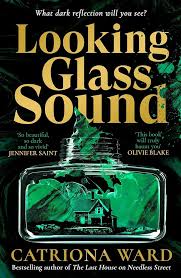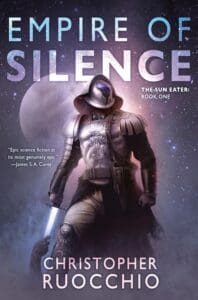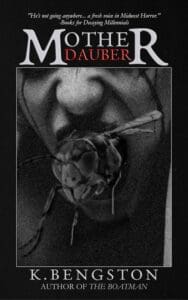
Synopsis:
In a windswept cottage overlooking the sea, Wilder Harlow begins the last book he will ever write. It is the story of his childhood companions and the shadowy figure of the Daggerman, who stalked their New England town. And it is the story of Sky, Wilder’s one-time friend, who stole his unfinished memoir to turn it into a lurid bestselling novel, then died without ever explaining why.
This book is Wilder’s last chance for revenge. But as he writes, he begins to find notes written in Sky’s signature green ink, and events in his manuscript start to chime eerily with the present. Is Sky haunting him? And who is the dark-haired woman drowning in the cove, whom no one else can see? With his grip on reality slipping, Wilder begins to fear that this will not only be his last book, but the last thing he ever does…
Review:
Prior to picking this up, I published my review of Paul Tremblay’s “Horror Movie,” and rambled on for far longer than I usually would. My fingers hurt, my heart was pounding, and my brain was scrambled- it’s a novel I toiled over for far longer than my sanity allowed. What did I pick up next? Something to aid my recovery? A straight-forward thriller? A quick novella? An old favourite? HA. Naturally, I plunged headfirst into the labyrinthe world of Catriona Ward’s “Looking Glass Sound,” (my fancy signed hardback came courtesy of our very own Ed Crocker, and thank you as well to Viper books for my paperback ARC). To cut a very long story short dear reader, I am not okay. I may never be okay again. I jumped straight from the frying pan into a swirling vortex of literary organised chaos, armed with only a leaky compass and my already dazed sense of direction. Straight off the ghost train onto the spinning tea-cups. This meta-fictional, maddening, and moving, coming-of-age story nearly finished me off (in the best way possible) and I must say, despite the mental acrobatics I’ve been performing, May is shaping up to be a very good reading month indeed.
Catriona Ward does not take it easy on us reviewers- this book will be about as easy to summarise as the origins of the universe.
The first third of our story is like Arthur Ransome’s classic “Swallows and Amazons,” was rewritten by Stephen King. It’s a story about friendship and betrayal and the unmatched intensity of teenage love. Yes, we begin in 1989, where we read Wilder Harlow’s memoir “The Daggerman of Whistler Bay.” His Uncle Vernon passes away during the night, leaving Wilder’s parents to deal with the estate. His cottage just off of the sea is beautiful, and his parents agree that before selling it, they should stay for the Summer. Castine, just off of Maine, is idyllic- but like most small towns in horror, it has its secrets. The missing women… and of course “The Daggerman.” Having never quite fit in at the all boys school he attends however, his mum and dad are thrilled when Nat and Harper take him under their wings- and agree to keep the house as a holiday home. Unfortunately on his next visit, things take a horrible turn when a gut-wrenching, oyster-knife twisting revelation comes to light. This unveiling echoes throughout the lives of each character in each story (there are FIVE) throughout the entirety of “Looking Glass Sound.”
As I said, this story is what I consider the first third of “Looking Glass Sound”. The second third is the story… of that story… being stolen. It’s 1991, and Wilder has gone to college. Still plagued by the memory of that Summer, he suffers with night terrors, the two french students in the dorm next to him hate him, and his room-mate Doug isn’t particularly a fan of being woken in the early hours either. That’s when he meets Sky. Sky is an amateur writer who just so happens to be in the right place at the right time when Wilder suffers a panic attack in a lecture. He is understanding and kind, and offers to move in with Wilder, nightmares or not. Despite their bond, and the intimacy within their relationship, things are not as they seem, and it turns out Sky’s unusual interest in Wilder’s summer holiday was not as innocent as he made out.
In case you’re yet to figure it out, this is a novel about stories, their power, their magic, their immortality, and the importance of who is telling them. The final third of this story is about (brace yourself) the story of our stolen story being reclaimed. We’re finally caught up to the modern day, and Wilder (who seems to be suffering with Charles Bonnet syndrome) returns to Castine and Whistler Bay. Sky, who wrote the best-selling “The Sound and Dagger,” (of course, plagiarised all those years ago) had taken up residence there, and following his death, Wilder feels it’s time to finally speak his truth.
For the sake of clarity, the most easy way to dissect the book was through its timelines, as modelled above. Now here comes the slow descent into madness (which is actually a symbolic move on my part?) As aforementioned, this is a story about stories, and it encompasses five narratives… each crafted by different characters. These characters may or may not be real… and that’s ultimately for you to decide. Each character’s recounting interacts with and refracts the others, creating a complex interplay of perspectives. It’s our job to engage actively, piece together the fragments and form a cohesive and very fulfilling whole. Whilst Ward’s sprawling yet deliberate meta-fictional style certainly pushes our boundaries, and leaves us with lots to ponder- every word is carefully selected: this is a book with method to its madness.
We’re already halfway down the rabbit hole, so why not? The obvious ways to dissect this book are either by its timelines or by the books embedded within it, but I quickly wanted to discuss the idea of frames. If we’re talking technical, there’s a recurring motif of dark against light: from the glowing mouth of the cave, to the light from the porthole window that refuses to close, to Wilder’s degenerative condition which leaves him with white spots in his vision. When something is silhouetted it’s abstracted, subjective… and perhaps this how Ward feels about literature.
A silhouette reveals only the outline of an object, leaving the interior details to the imagination. Ward’s layered narrative offers up a framework for readers to fill with their own interpretations, and this abstraction allows for such fluid boundaries within the novel. It constantly sways between reality and fiction (this is called auto-fiction if you’re interested) challenging readers to distinguish between what is truth and what is constructed. This of course all ultimately refers back to story-telling- offering a commentary on its nature. When you strip back everything, the darkness and the light, “Looking Glass Sound,” is an exploration of the relationship between a writer and their reader.
In conclusion (this review has genuinely gotten NO easier) “Looking Glass Sound,” is a masterful and complex narrative that challenges and rewards in equal measure. It doesn’t so much push boundaries as it does obliterate them; it’s a mind-bending odyssey that defies every pre-conceived notion of what I thought literature was.









Leave a Reply